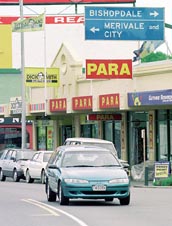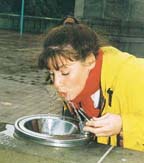|
Keeping our parks
in world-class condition |

|
| Parks play an important role in the
"garden city" image that Christchurch gives to visitors and residents. They
provide numerous forms of recreation to many Christchurch people. They also protect and
conserve our City's open spaces and natural resources. |
The proposed budget for parks in the Christchurch City Council Draft
Plan 1999 is $15,455,540 in operating costs. That equates to around $1.56 for each
ratepayer per week to maintain our 670 parks for the year.
The capital budget of $9,180,151 is generally used for purchasing new land and for
development and replacement of playgrounds, playing fields, trees and landscaping, paths,
walkways and various recreation facilities.
Operating costs are used to maintain existing and new parks.
A number of issues associated with the growth of Christchurch have had an impact on
planning for the city's parks in the coming financial year. They are incorporated in the
draft plan and include:
- There are 23 new parks or extensions of existing parks
across the city which need to be developed with trees, plants, playgrounds and paths so
that they can be properly used and enjoyed by local people.
- Development of the Sister Cities Garden Park at Halswell
Quarry Park.
- Building an information centre and employing a park ranger
at Travis Wetland.
- Development of parkland on the Port Hills to conserve the
environment as a future recreational resource for Christchurch.
|
|
| Safe, reliable roads for motorists
and the community |

|
Keeping our City mobile is one of Christchurch City
Council's most important roles.
| The Council plans, builds and manages
Christchurch roads. This includes maintenance of all local roads and construction of new
roads. |
The proposed budget for roads in the Christchurch City Council
Draft Plan 1999 is $28,624,753 in capital costs
and $31,821,484 in operating costs. With financial assistance from central government -
derived from petrol tax - to assist in the Council's management of the roads, that equates
to around $166 for each ratepayer per year, or $3.20 per week.
To maintain and improve the current service provided to the community and motorists using
Christchurch roads, the draft plan includes the following proposals:
- 19 kilometres of kerb and channel renewal.
- $1.3 million on road safety projects.
- Increasing the rate at which overhead services such as
power and telecommunications wires are put underground from two kilometres to five
kilometres per year - the cost of this increase is around $1.15 million.
- Seven major roading projects.
- Continuing activities to make Christchurch streets safer
and more appealing to cyclists and pedestrians.
- $0.74 million on cycleway projects
|
|
| The Highest Quality Water Supply |

|
Christchurch people are justifiably proud of their fresh
water supply. In quality it matches the best in the country. In price ratepayers pay
around one third of the cost of water users in other major centres. The proposed budget
for water supply in the Christchurch City Council Draft Plan 1999
is $6,869,014 in capital costs and $10,024,125 in operating costs. With some direct
charges levied on major users of Christchurch water, that equates to around $1.01 for each
residential ratepayer per week for five or six tonnes of water delivered weekly to the
average household.
| Preserving and enhancing this high level of
service is the main objective of the Council's services in water supply. Activities
planned for the coming year include: |
- Reducing the level of leakage occurring in the water
reticulation system to 15 per cent by identifying and repairing leaks.
- Improving the security of the water supply system by
carrying out public education to minimise the risk of back-flow, or the siphoning of
tainted water back into the the supply system from household or industrial water users.
- Reducing the risk of further groundwater contamination in
the Woolston area, which is caused by heavy demand in this area, by pumping water from
other parts of the City.
- Ensuring the Council, as the largest user of water in
Canterbury, provides an appropriate response to the Canterbury Regional Council's long
term water use strategy which is scheduled to be prepared this year.
|
|


